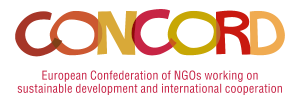
When Belgium announced its lockdown in mid-March due to the outbreak of the novel coronavirus, CONCORD, with its offices in Brussels, moved its policy and advocacy work (almost) seamlessly online. Like many millions of others in Belgium and Europe. Our children started online schooling and we stayed connected with the latest news and chatted with family and friends using various digital messaging and video-telephony services. Compare this situation with that of millions of people in countries like Egypt, Nigeria, Rwanda or Eritrea who couldn’t switch to remote working – and children who couldn’t switch to remote learning methods once schools closed – because they lack access to electricity, to a computer or mobile phone, or to the internet. That gives a whole other meaning to the word ‘confinement’ – one cannot even find information about how to stay safe.
Digitalisation is transforming the world whether we like it or not. New information and communication technologies are proliferating so quickly, in such a multitude of directions all over the globe, that it is hard to keep track of the changes, let alone understand their full implications. One thing is clear, however: with around half of the world’s population still not connected, those who remain in the analog world, risk being left far behind. Some would even argue that they risk being pushed further behind. From news and entertainment to education to e-health and other government services, the internet has been playing an increasingly central role in our lives.
As a result of Covid-19, the internet became a prerequisite for being able to participate in society. The so-called digital divide between those who have access to information and communication technologies and those who do not was made very stark. Being “connected” can be a lifeline, whether it’s to access cash transfer apps or domestic abuse helplines. Those who have little to no access to digital technologies find themselves unable to adapt to rapidly evolving situations. And these kinds of instances and examples are only going to increase going forward.
I represent CONCORD in the EU’s global Policy Forum on Development and I learnt from our partners and colleagues around the world how difficult it was for them to operate in some instances – not just because of the necessary restrictions, but because everything went online and many of the people they work with – in rural communities or disadvantaged groups – simply didn’t have access. This was particularly the case for women. So, the COVID-19 crisis has also underscored how the digital divide aggravates existing economic, social, education and gender inequalities, as well as the urban-rural divide.
That’s why the humble radio has been this year’s unexpected star of remote learning. From Afghanistan to Zimbabwe, broadcasting lessons on public radio has been the go-to quick fix, preventing many pupils and students from missing out on education.
So, what are the challenges on the road ahead? From the cost of devices to the cost of data, affordability remains the main barrier preventing people from going online. The second barrier is lack of digital skills. Education to at least secondary level is the biggest factor predicting whether people are able to use the internet to increase their income and wellbeing. Entrepreneurs like Ory Okolloh, creator of Ushahidi, a platform that can crowd-source and map incidents of violence and abuse during elections and crises, are actively seeking solutions to local issues.
So, if we’re going to bridge the digital divide, the EU must pay attention – in its ongoing push for a digital transformation – to ensure that inequalities are not even further magnified. Full connectivity must be guaranteed for everyone. The internet should be viewed as a public utility like schools or street lights, a responsibility of society to manage and maintain. And while we are busy connecting everyone, alternatives must be found for those who are not yet online.
Change won’t come overnight, but the EU can play its part by supporting open, secure and affordable access to the internet, by ensuring equal access, use and creation of digital technology, by promoting gender sensitive and inclusive digital infrastructure planning and by including digital literacy in school curricula. Most particularly, girls and young women should be encouraged to take part in science, technology, engineering, and maths subjects at school and in non-formal education.
Our investments today reflect society’s commitment to the future. So let’s ensure that those investments bring lasting prosperity and equality for everyone.
Tanya Cox,
CONCORD Director
